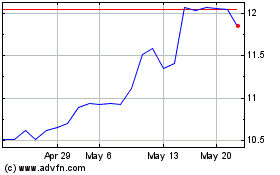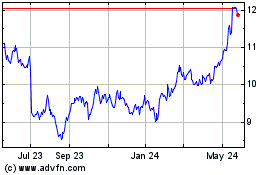Mainland Chinese Investors Pivot to Safer Hong Kong Stocks
August 31 2016 - 2:07AM
Dow Jones News
By Anjie Zheng
HONG KONG--Chinese investors are plowing money into well-known
Hong Kong-listed stocks as they join the global hunt for yield and
safe assets, a trend that points to a change in investing tastes on
the mainland.
The surge of mainland money has helped boost the share prices of
the major Chinese banks listed in Hong Kong, such as Industrial and
Commercial Bank of China Ltd., the world's biggest bank by assets
and China Construction Bank Corp., both of which are among the top
gainers in the benchmark Hang Seng Index this year. Chinese
investors have also piled into blue-chip companies such as global
bank HSBC Holdings PLC and tech giant Tencent Holdings Ltd. this
year, the two biggest components of the index.
Mainland Chinese investors, who can access the Hong Kong market
via a trading link with the Shanghai exchange, have in the past
preferred investing in smaller companies that had high growth
potential but carried plenty of risk. A favorite name before its
trading halt last year was highflying Hanergy Thin Film Group Ltd.,
whose share price surged urged 6.6 times in one year before
plunging 47% in May 2015.
This year, amid relatively subdued markets--the Hang Seng is up
5% in 2016--Chinese investors have swung toward companies that may
have less exciting prospects but at least pay a decent dividend.
ICBC, for example, yields around 5.6%, while HSBC yields 7.7%. That
compares with an average dividend yield for Hang Seng Index stocks
of 3.5% and 2.1% for Shanghai Composite shares.
"Chinese investors last year bought small-caps because they were
chasing capital gains since the market was rallying strongly," said
Edmond Law, an analyst at UOB Kay Hian Research. "This year,
because the market isn't performing as strongly, they are chasing
yield."
Bi-weekly data on the most popular stocks for Chinese funds
buying Hong Kong shares via Shanghai bear out the trend. ICBC's
Hong Kong shares, for example, have been among the 10 most-traded
stocks during 12 two-week periods out of 15 this year, helping push
its share price up 10.6% this year. Over the same period last year,
it was a top-traded stock just once.
One attraction for mainland investors is that shares of
dual-listed Chinese companies, particularly banks, are often
cheaper in Hong Kong, where they are known as H-shares, than in
Shanghai, where they are called A-shares. ICBC trades at a 5.1%
discount in Hong Kong, for example, while other banks such as China
Construction Bank Corp. and Agricultural Bank of China Ltd. trade
at 4.9% and 16.8% discounts, respectively.
The difference makes it cheaper for investors to receive the
same dividend payout in Hong Kong--an increasingly important
consideration for mainland investors, according to Qi Wang , chief
executive at MegaTrust Investments, a mainland-based fund
manager.
The shift into high-dividend stocks is "not a temporary market
change like picking different sectors every month," Mr. Qi said.
"It's a long-term secular change."
"Very few A-shares pay dividends. So investors are desperately
seeking higher yield. This is something we're seeing in both A- and
H-share markets," he said.
There is little clear data on what type of mainland investors
are leading the charge into major Hong Kong-listed stocks. However,
the trend appears to be driven in part by large institutional
investors such as insurance and pension funds since Chinese retail
investors are still less focused on high-yield stocks, according to
Jian Shi Cortesi, China fund manager at GAM Holding AG, which
manages $115.49 billion globally.
Chinese investors' hunt for yield has helped so-called
southbound investment flows from Shanghai to Hong Kong via the
Stock Connect system to outweigh those going in the other direction
this year. Analysts expect that more money could start to flow from
the mainland into Hong Kong later this year, when a new trading
link with the Shenzhen Stock Exchange is opened.
For sure, Chinese investors have other reasons to invest in Hong
Kong. Often it is the only place they can buy shares in major
Chinese brands that don't have a listing at home, such as Tencent,
electric-vehicle maker Geely Automobile Holdings Ltd., telecom
giant China Mobile Ltd. and casino operator Sands China Ltd.
Some Chinese investors have also looked to invest in Hong Kong
to act as a defense against currency depreciation. The Chinese yuan
has dropped 7% in the past year against the U.S. dollar. The Hong
Kong dollar is pegged to the greenback, so putting money into
relatively safer Hong Kong-listed stocks has become a way for
Chinese investors to benefit.
"High-yielding bank stocks are being used as a proxy against the
weakening yuan," said Wendy Liu, equity strategist at Nomura
Holdings Inc.
(END) Dow Jones Newswires
August 31, 2016 02:52 ET (06:52 GMT)
Copyright (c) 2016 Dow Jones & Company, Inc.
Industrial and Commercia... (PK) (USOTC:IDCBY)
Historical Stock Chart
From Nov 2024 to Dec 2024

Industrial and Commercia... (PK) (USOTC:IDCBY)
Historical Stock Chart
From Dec 2023 to Dec 2024


